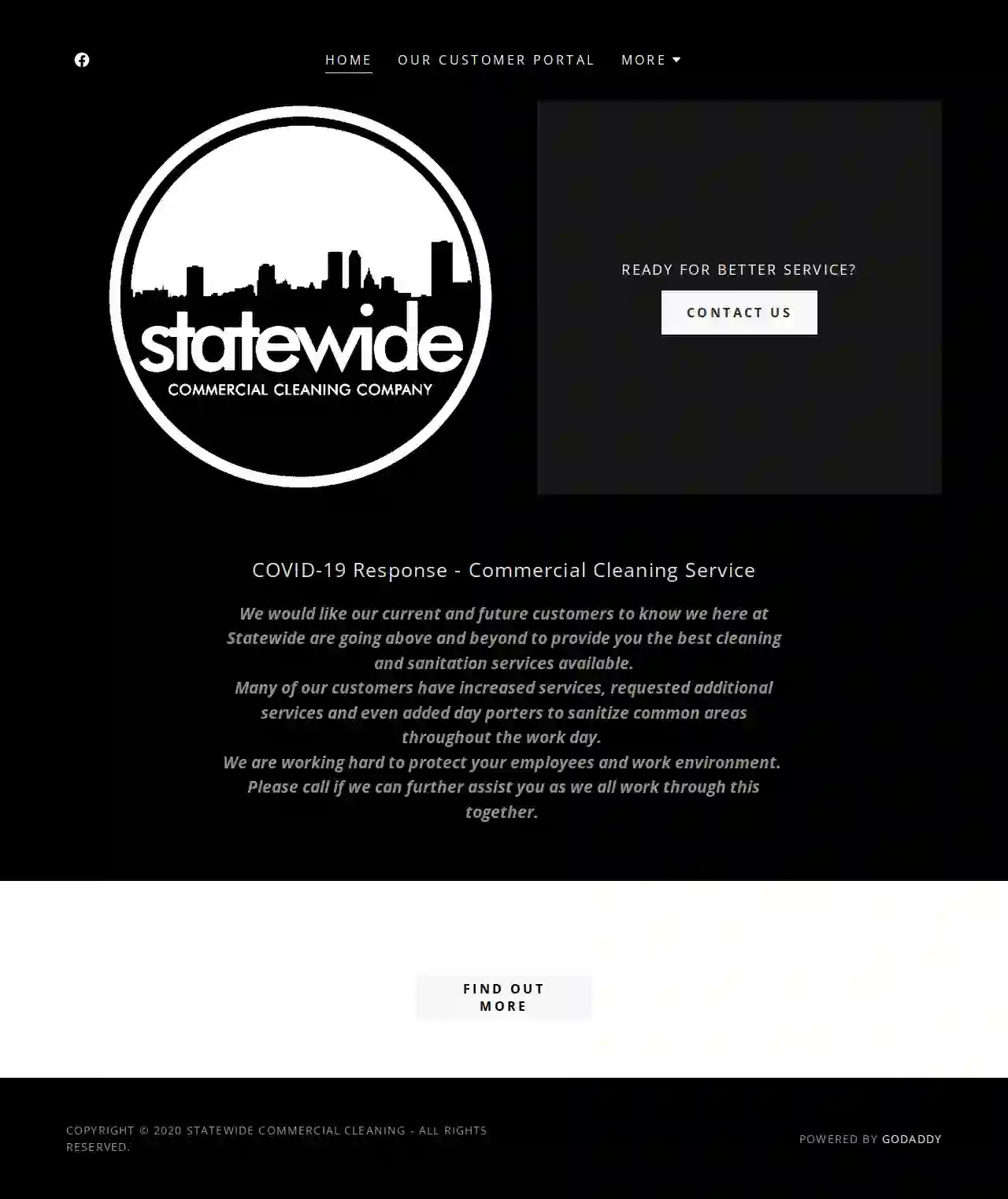Cleaning Services Mustang
Find top Cleaning Companies in Mustang
Get multiple Cleaning Companies quotes for your project today! Compare profiles, reviews, accreditations, portfolio, etc... and choose the best service.
Service Needed
City or Town
- Ga
Gamble Janitorial Service
59 reviewsOklahoma City, US- Services
- Why Us?
Get Quote 
Spic & Span Commercial Cleaning, LLC
3.412 reviewsOklahoma City, US- Services
- Why Us?
Get Quote
Hoodz of Oklahoma
4.29 reviewsOklahoma City, US- Services
- Why Us?
Get Quote
Domestic Aide of Tulsa
4.616 reviewsTulsa, US- Services
- Why Us?
Get Quote
Pristine Commercial Cleaning Service, Inc.
4.36 reviewsTulsa, US- Services
- Why Us?
Get Quote
Taylor Commercial Cleaning Services of Oklahoma
59 reviewsTulsa, US- Services
- Why Us?
Get Quote- Su
Sud’s Cleaning LLC / FB@Suds Cleaning OKC
4.717 reviewsOklahoma City, US- Services
- Why Us?
Get Quote 
Statewide Commercial Cleaning
37 reviewsTulsa, US- Services
- Why Us?
Get Quote
Consumer Textile Corporation
4.112 reviewsOklahoma City, US- Services
- Why Us?
Get Quote
SourceOne Management Services
2.613 reviewsTulsa, US- Services
- Why Us?
Get Quote
Over 60,241+ Cleaning Contractors on our directory
Our janitorial pros operate in Mustang & surroundings!
CleaningMatch has curated and vetted the Best Janitorial Contractors arround Mustang. Find a top & reliable contractor today.
Frequently Asked Questions About Cleaning Services
Find answers to common questions about cleaning services and hiring cleaning companies in the USA.
- Residential Cleaning: Covers cleaning homes, apartments, and other living spaces.
- Commercial Cleaning: Focuses on cleaning offices, retail stores, and other business establishments.
- Deep Cleaning: A thorough and intensive cleaning that covers areas often neglected during regular cleaning.
- Move-In/Move-Out Cleaning: Comprehensive cleaning performed before or after moving into or out of a property.
- Post-Construction Cleaning: Specialized cleaning after construction or renovation projects to remove debris and dust.
- Specialized Cleaning: Includes services like carpet cleaning, window cleaning, upholstery cleaning, and more.
- Prepare the Windows: Remove dust and debris from windows using a brush, vacuum, or damp cloth.
- Cleaning Solution: Use a commercial glass cleaner or a homemade solution of equal parts water and vinegar.
- Spray and Wipe: Spray the cleaning solution onto the window, ensuring even coverage.
- Squeegee Technique: Use a squeegee to wipe the cleaner from top to bottom, overlapping each stroke by about an inch. Wipe the squeegee blade clean after each stroke.
- Dry Edges: Wipe the edges of the window with a clean, dry microfiber cloth to remove any remaining moisture.
- Frees up your time: Cleaning can be time-consuming, especially for larger properties or busy individuals. Hiring a cleaning service allows you to focus on other priorities, such as work, family, or leisure activities.
- Ensures a deeper clean: Professional cleaners are trained in effective cleaning techniques and have access to specialized equipment, resulting in a more thorough clean than you might achieve on your own.
- Reduces allergens and improves hygiene: Thorough cleaning removes dust, allergens, and germs, creating a healthier living environment, particularly for those with allergies or sensitivities.
- Reduces stress and improves well-being: Coming home to a clean and tidy home can reduce stress and promote a sense of calm and order.
- Online Directories: Use online directories like CleaningMatch to search for cleaning services in your area. Filter your search results by the specific cleaning type you need.
- Search Engines: Use search engines like Google to find cleaning services specializing in your desired cleaning type. For example, search for 'post-construction cleaning services near me' or 'eco-friendly cleaning services in [city name].'
- Ask for Referrals: Ask friends, family, neighbors, or colleagues if they know of any reputable cleaning services specializing in your desired cleaning type.
- Check Company Websites: Visit the websites of cleaning services in your area to see if they list the specific cleaning type you need among their services.
- Contact Companies Directly: Contact cleaning companies directly to inquire about their specialization in your desired cleaning type.
What are the different types of cleaning services?
Cleaning services cater to diverse needs and offer a range of options, including:
The best type of cleaning service depends on your specific needs, the size and condition of the property, and your budget.
The best type of cleaning service depends on your specific needs, the size and condition of the property, and your budget.
What is the best way to clean windows without streaks?
Achieving streak-free windows requires the right technique and cleaning solutions. Follow these steps:
For best results, clean windows on a cloudy day or in the shade to prevent the cleaning solution from drying too quickly and leaving streaks.
For best results, clean windows on a cloudy day or in the shade to prevent the cleaning solution from drying too quickly and leaving streaks.
Are cleaning services worth it?
The value of a cleaning service depends on your individual circumstances and priorities. Consider these benefits:
If you value these benefits and find the cost justifiable, cleaning services can be a worthwhile investment in your time and well-being.
If you value these benefits and find the cost justifiable, cleaning services can be a worthwhile investment in your time and well-being.
How do I find a cleaning service that specializes in [specific type of cleaning]?
If you need a cleaning service specializing in a particular type of cleaning, such as post-construction cleaning, window cleaning, or green cleaning, follow these steps:
By using these methods, you can find a qualified cleaning service that meets your specific cleaning needs.
By using these methods, you can find a qualified cleaning service that meets your specific cleaning needs.
What are the different types of cleaning services?
Cleaning services cater to diverse needs and offer a range of options, including:
The best type of cleaning service depends on your specific needs, the size and condition of the property, and your budget.
- Residential Cleaning: Covers cleaning homes, apartments, and other living spaces.
- Commercial Cleaning: Focuses on cleaning offices, retail stores, and other business establishments.
- Deep Cleaning: A thorough and intensive cleaning that covers areas often neglected during regular cleaning.
- Move-In/Move-Out Cleaning: Comprehensive cleaning performed before or after moving into or out of a property.
- Post-Construction Cleaning: Specialized cleaning after construction or renovation projects to remove debris and dust.
- Specialized Cleaning: Includes services like carpet cleaning, window cleaning, upholstery cleaning, and more.
The best type of cleaning service depends on your specific needs, the size and condition of the property, and your budget.
What is the best way to clean windows without streaks?
Achieving streak-free windows requires the right technique and cleaning solutions. Follow these steps:
For best results, clean windows on a cloudy day or in the shade to prevent the cleaning solution from drying too quickly and leaving streaks.
- Prepare the Windows: Remove dust and debris from windows using a brush, vacuum, or damp cloth.
- Cleaning Solution: Use a commercial glass cleaner or a homemade solution of equal parts water and vinegar.
- Spray and Wipe: Spray the cleaning solution onto the window, ensuring even coverage.
- Squeegee Technique: Use a squeegee to wipe the cleaner from top to bottom, overlapping each stroke by about an inch. Wipe the squeegee blade clean after each stroke.
- Dry Edges: Wipe the edges of the window with a clean, dry microfiber cloth to remove any remaining moisture.
For best results, clean windows on a cloudy day or in the shade to prevent the cleaning solution from drying too quickly and leaving streaks.
Are cleaning services worth it?
The value of a cleaning service depends on your individual circumstances and priorities. Consider these benefits:
If you value these benefits and find the cost justifiable, cleaning services can be a worthwhile investment in your time and well-being.
- Frees up your time: Cleaning can be time-consuming, especially for larger properties or busy individuals. Hiring a cleaning service allows you to focus on other priorities, such as work, family, or leisure activities.
- Ensures a deeper clean: Professional cleaners are trained in effective cleaning techniques and have access to specialized equipment, resulting in a more thorough clean than you might achieve on your own.
- Reduces allergens and improves hygiene: Thorough cleaning removes dust, allergens, and germs, creating a healthier living environment, particularly for those with allergies or sensitivities.
- Reduces stress and improves well-being: Coming home to a clean and tidy home can reduce stress and promote a sense of calm and order.
If you value these benefits and find the cost justifiable, cleaning services can be a worthwhile investment in your time and well-being.
How do I find a cleaning service that specializes in [specific type of cleaning]?
If you need a cleaning service specializing in a particular type of cleaning, such as post-construction cleaning, window cleaning, or green cleaning, follow these steps:
By using these methods, you can find a qualified cleaning service that meets your specific cleaning needs.
- Online Directories: Use online directories like CleaningMatch to search for cleaning services in your area. Filter your search results by the specific cleaning type you need.
- Search Engines: Use search engines like Google to find cleaning services specializing in your desired cleaning type. For example, search for 'post-construction cleaning services near me' or 'eco-friendly cleaning services in [city name].'
- Ask for Referrals: Ask friends, family, neighbors, or colleagues if they know of any reputable cleaning services specializing in your desired cleaning type.
- Check Company Websites: Visit the websites of cleaning services in your area to see if they list the specific cleaning type you need among their services.
- Contact Companies Directly: Contact cleaning companies directly to inquire about their specialization in your desired cleaning type.
By using these methods, you can find a qualified cleaning service that meets your specific cleaning needs.